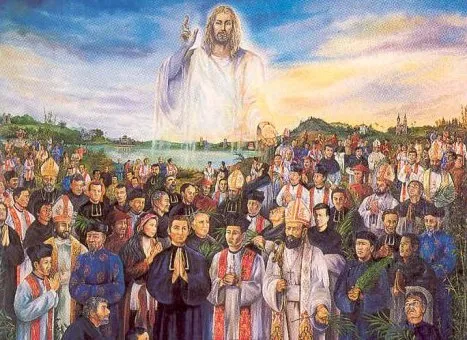 This work of art was displayed at St. Peter’s on the occasion of the Vatican’s celebration of the canonization of 117 Vietnamese martyrs on July 19, 1988. / Fair use.
This work of art was displayed at St. Peter’s on the occasion of the Vatican’s celebration of the canonization of 117 Vietnamese martyrs on July 19, 1988. / Fair use.
Denver, Colo., Nov 24, 2022 / 10:00 am (CNA).
Christianity arrived in Vietnam in 1533, and many Vietnamese Christians became saints and martyrs in different waves of persecution. The known and unknown who died for Jesus Christ are honored Nov. 24, the feast of the Vietnamese Martyrs.
From 1630 to 1886, somewhere between 130,000 and 300,000 Christians faced martyrdom in the country, often after being held captive and brutally tortured. Others were forced to flee to the mountains and the forests or be exiled to other countries.
The persecutions often came amid political changes and social tensions, especially under emperors who would adopt anti-Christian policies out of fear of foreign influence.
The feast of the Vietnamese Martyrs honors these many unnamed martyrs, represented by 117 known martyrs who died for the Catholic faith in Vietnam during the late 18th and early 19th centuries.
Their number includes 96 Vietnamese,11 Spaniards, and 10 French. Eight of the group were bishops, 50 were priests, and 59 were lay Catholics. The lay Catholic saints include a 9-year-old child and Agnese Le Thi Thành, a mother of six.
Some of the priests were Dominicans, others were diocesan priests who belonged to the Paris Mission Society.
The martyrs are also grouped as “St. Andrew Dung-Lac and companions.” St. Andrew Dung-Lac was born to poor non-Christian parents who entrusted him to a guardian who was a Catholic catechist. He was baptized and later ordained a priest in 1823. He served as a parish priest and missionary across Vietnam. He was imprisoned more than once and ransomed by the Catholic faithful.
He was martyred by beheading in Hanoi on Dec. 21, 1839.
Groups of Vietnamese martyrs were beatified by various popes. Pope John Paul II canonized the 117 martyrs together on June 19, 1988, praising their witness.
“How to remember them all? Even if we limited ourselves to those canonized today, we could not dwell on each of them,” the pope reflected in his homily for the canonization Mass. He compared the persecutions in Vietnam to that faced by the apostles and early Christians.
“Once again we can say that the blood of the martyrs is for you, Christians of Vietnam, a source of grace to progress in the faith,” he continued. “In you the faith of our fathers continues to be transmitted to the new generations. This faith remains the foundation of the perseverance of all those who, feeling authentically Vietnamese, faithful to their land, at the same time want to continue to be true disciples of Christ.”
He added: “From the long line of martyrs, their sufferings, their tears comes the ‘harvest of the Lord.’ It is they, our teachers, who give me the great opportunity to present to the whole Church the vitality and greatness of the Vietnamese Church, its vigor, its patience, its ability to face difficulties of all kinds and to proclaim Christ. We give thanks to the Lord for what the Spirit generates abundantly among us!”
“All Christians know that the Gospel asks us to be submissive to men’s institutions out of love for the Lord, to do good, to behave like free men, to respect everyone, to love our brothers, to fear God, to honor the authorities and public institutions,” the pope said.
John Paul II said the Vietnamese martyrs began “a profound and liberating dialogue” with the Vietnamese people and culture. They proclaimed “the truth and universality of faith in God” and proposed “a hierarchy of values and of duties particularly suited to the religious culture of the whole oriental world.”
“Under the guidance of the first Vietnamese catechism, they bore witness to the fact that it is necessary to adore only one God, as the one God who created heaven and earth,” Pope John Paul II continued. “Faced with the coercive dispositions of the authorities regarding the practice of the faith, they affirmed their freedom of belief, arguing with humble courage that the Christian religion was the only thing they could not abandon, since they could not disobey the supreme sovereign: the Lord.”
“Furthermore, they forcefully proclaimed their will to be loyal to the authorities of the country, without contravening all that was just and honest; they taught to respect and venerate their ancestors, according to the customs of their land, in the light of the mystery of the resurrection,” the pope said.
“The Vietnamese Church, with her martyrs and through her own testimony, was able to proclaim her commitment and she will not to reject the country’s cultural tradition and legal institutions; on the contrary, she has declared and demonstrated that she wants to be incarnated in this country, faithfully contributing to the true growth of the homeland,” Pope John Paul II said.
The pontiff invoked the old Christian saying “the blood of the martyrs is the seed of the Church.” He also noted those who face persecution in the present day.
“In addition to the thousands of faithful who, in past centuries, walked in Christ’s footsteps, there are still today those who work, sometimes in anguish and self-denial, with the sole ambition of being able to persevere in the Lord’s vineyard as faithful who understand the goods of the kingdom of God.”
The duty to work and pray for the coming of the kingdom of God, the pope said, is a “constant and rigorous interior activity” that “requires the patience and trusting expectation of those who know that God’s providence is working with them to make their efforts and also their suffering effective.”
[…]





